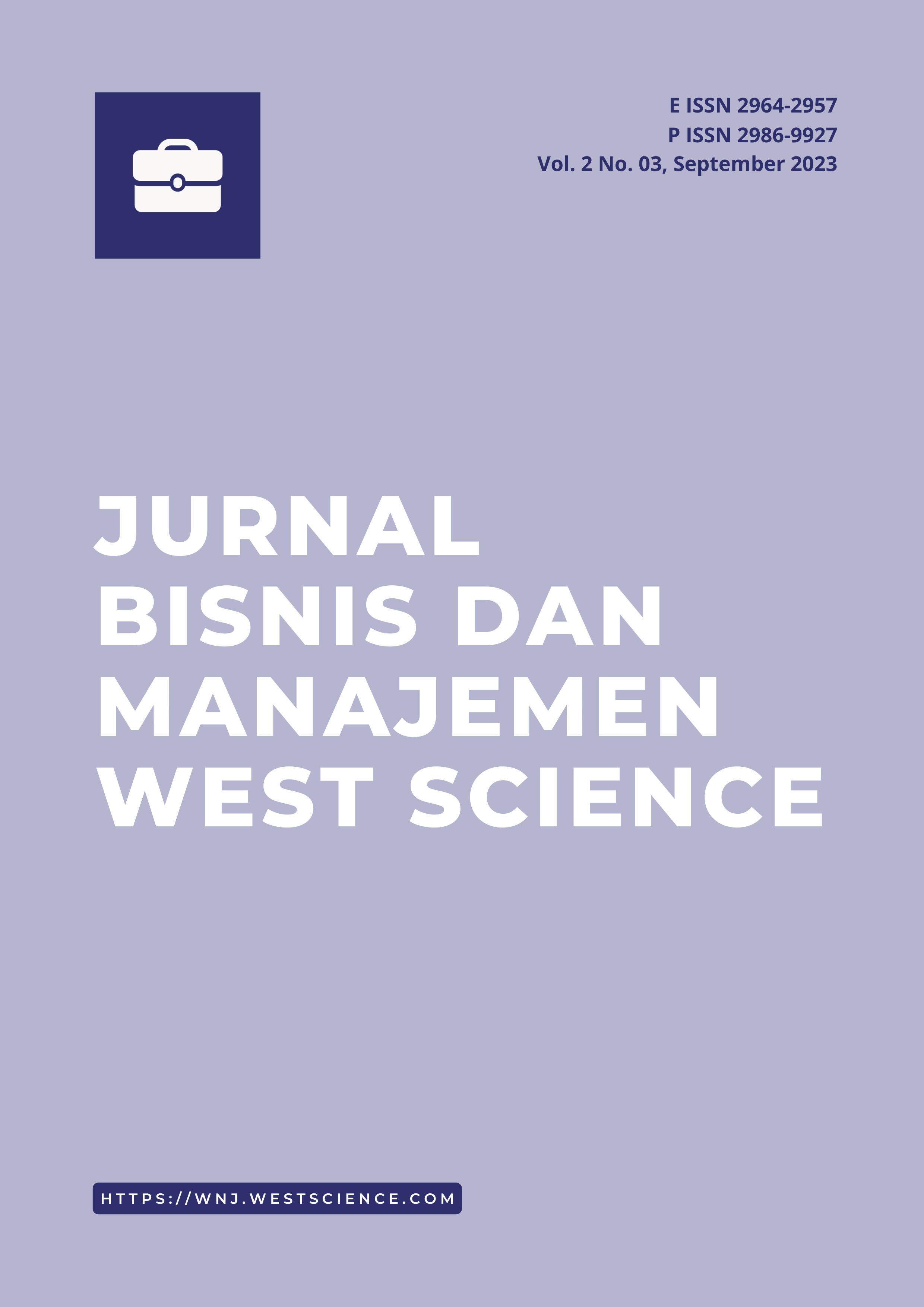Bisnis Berkelanjutan dan Tanggung Jawab Sosial Perusahaan: Studi tentang Dampak dan Strategi Implementasi
DOI:
https://doi.org/10.58812/jbmws.v2i03.557Kata Kunci:
Bisnis, Berkelanjutan, Tanggung Jawab Sosial, Strategy, BibliometrikAbstrak
Penelitian ini melakukan analisis komprehensif terhadap literatur mengenai praktik bisnis berkelanjutan dan tanggung jawab sosial perusahaan (CSR) melalui kombinasi analisis bibliometrik dan eksplorasi kualitatif. Penelitian ini bertujuan untuk mengungkap dampak, tren, dan strategi implementasi di lapangan. Analisis bibliometrik menggunakan VOSviewer untuk memvisualisasikan penulis yang berpengaruh, karya yang sering dikutip, kelompok tematik, dan distribusi kata kunci. Selain itu, investigasi kualitatif menggali strategi implementasi dunia nyata yang digunakan oleh organisasi untuk praktik bisnis berkelanjutan dan inisiatif CSR. Temuan-temuan tersebut mengungkapkan kelompok-kelompok tematik yang berbeda, termasuk analisis CSR, praktik keberlanjutan perusahaan, implikasi CSR, efek inovasi, tantangan, dan kekuatan pendorong. Penulis berpengaruh dan karya-karya penting yang telah membentuk wacana juga diidentifikasi. Selain itu, strategi implementasi yang umum digunakan juga diungkap, dengan menampilkan pendekatan-pendekatan seperti optimalisasi rantai pasokan, pelibatan pemangku kepentingan, dan efisiensi sumber daya. Tantangan yang dihadapi oleh organisasi dan hasil yang dilaporkan dari strategi yang berhasil memberikan wawasan praktis bagi bisnis yang bertujuan untuk mengintegrasikan keberlanjutan dan CSR ke dalam operasi mereka.
Referensi
Abdallah, M., Tawfik, A. M., Monghasemi, S., Clevenger, C. M., & Adame, B. A. (2020). Developing commute optimization system to minimize negative environmental impacts and time of business commuters. International Journal of Sustainable Transportation, 14(2), 101–119.
Allui, A., & Pinto, L. (2022). Non-financial benefits of corporate social responsibility to Saudi companies. Sustainability, 14(6), 3446.
Banerjee, S. B. (2008). Corporate social responsibility: The good, the bad and the ugly. Critical Sociology, 34(1), 51–79.
Beach, R. W., & Smith, B. E. (2022). Using digital tools for studying about and addressing climate change. In Research Anthology on Environmental and Societal Impacts of Climate Change (pp. 723–747). IGI Global.
Bocken, N. M. P., Short, S. W., Rana, P., & Evans, S. (2014). A literature and practice review to develop sustainable business model archetypes. Journal of Cleaner Production, 65, 42–56.
Branco, M. C., & Rodrigues, L. L. (2006). Corporate social responsibility and resource-based perspectives. Journal of Business Ethics, 69, 111–132.
Carroll, A. B. (1999). Corporate social responsibility: Evolution of a definitional construct. Business & Society, 38(3), 268–295.
Carroll, A. B., & Shabana, K. M. (2010). The business case for corporate social responsibility: A review of concepts, research and practice. International Journal of Management Reviews, 12(1), 85–105.
Dahlsrud, A. (2008). How corporate social responsibility is defined: an analysis of 37 definitions. Corporate Social Responsibility and Environmental Management, 15(1), 1–13.
Damert, M., Koep, L., Guenther, E., & Morris, J. (2021). Stakeholders and socially responsible supply chain management: The moderating role of internationalization. Sustainability Accounting, Management and Policy Journal, 12(4), 667–694.
Garriga, E., & Melé, D. (2004). Corporate social responsibility theories: Mapping the territory. Journal of Business Ethics, 53, 51–71.
Germain, R., & Grobecker, A. (2015). Antecedents of environmentally conscious operations in transitioning economies. International Journal of Operations & Production Management, 35(6), 843–865.
Hu, H., Huang, T., Cheng, Y., & Lu, H. (2019). The evolution of sustainable business model innovation: Evidence from a sharing economy platform in China. Sustainability, 11(15), 4207.
Kee, D. M. H., binti Misbah, N., binti Nazril, N. A., & binti Musa, N. H. (2021). The impact of COVID-19 on the fast-food industry in Malaysia. Journal of The Community Development in Asia, 4(2), 44–57.
Perrini, F. (2006). Corporate social responsibility: doing the most good for your company and your cause. Academy of Management Briarcliff Manor, NY 10510.
Porter, M. E., & Kramer, M. R. (2006). The link between competitive advantage and corporate social responsibility. Harvard Business Review, 84(12), 78–92.
Vogel, D. (2007). The market for virtue: The potential and limits of corporate social responsibility. Brookings Institution Press.
Rukmana, A. Y. (2017). ANALISIS PENGARUH PEMBELAJARAN DI SMK DAN KEAHLIAN KEWIRAUSAHAAN TERHADAP NIAT DAN SIKAP KEWIRAUSAHAAN SISWA SMK PELITA BANDUNG. Tesis Program Magister Management Universitas Widyatama Bandung.
Rukmana, A. Y., Bakti, R., Ma’sum, H., & Sholihannnisa, L. U. (2023). Pengaruh Dukungan Orang Tua, Harga Diri, Pengakuan Peluang, dan Jejaring terhadap Niat Berwirausaha di Kalangan Mahasiswa Manajemen di Kota Bandung. Jurnal Ekonomi Dan Kewirausahaan West Science, 1(02), 89–101.
Rukmana, A. Y., Meltareza, R., Harto, B., Komalasari, O., & Harnani, N. (2023). Optimizing the Role of Business Incubators in Higher Education: A Review of Supporting Factors and Barriers. West Science Business and Management, 1(03), 169–175.
Sudirjo, F., Putri, P. A. A. N., Rukmana, A. Y., & Hertini, E. S. (2023). DURING THE COVID-19 PANDEMIC, SOUTH GARUT DEVELOPED A MARKETING PLAN FOR SANSEVIERIA ORNAMENTAL PLANTS. Jurnal Ekonomi, 12(02), 1066–1075.
Unduhan
Diterbitkan
Cara Mengutip
Terbitan
Bagian
Lisensi
Hak Cipta (c) 2023 Alya Elita Sjioen, Amaludin, Arief Yanto Rukmana, Syamsulbahri, Idam Wahyudi

Artikel ini berlisensiCreative Commons Attribution-ShareAlike 4.0 International License.



















 Instagram
Instagram 